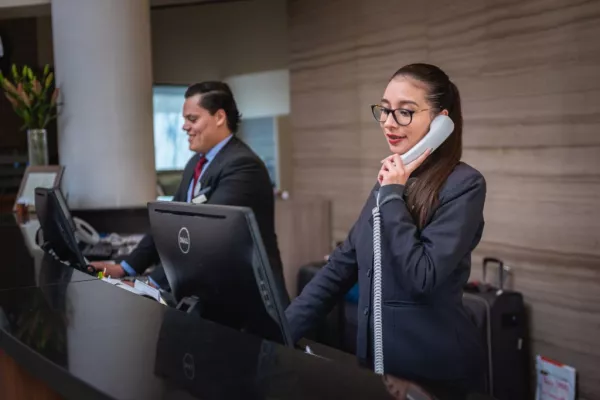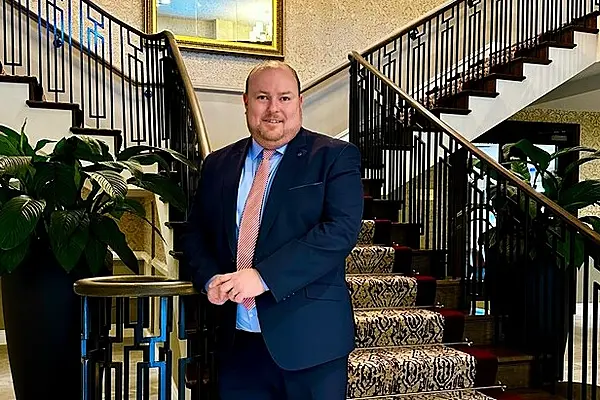Rodrigue Zbinden, CEO of Swiss technology company Morphean, looks at how security solutions that use cloud technology can offer assurance to the hospitality industry and its guests at a time of great uncertainty.
This article was originally published in the Summer 2021 issue of Hospitality Ireland Magazine, in July of 2021.
The success of the vaccination programme is bringing the full relaxation to pandemicrelated restrictions ever closer. With establishments already promoting greater freedoms for patrons, the more cautious of us will be watching closely to see how a rise in overseas variants might upset the agenda and alter the current road map. Treading carefully is certainly the key to moving forward and safeguarding these freedoms in the long term. With this in mind, hoteliers and others across the hospitality industry have much to consider as they welcome back their clientele, as normal service looks set to resume.
CCTV cameras have long been a common site across many industries, used to secure buildings both inside and out, and, in traditional terms, the physical management of guest and visitor access is something controlled at a gateway or front desk. Now, as technology continues to advance, digital infrastructure supports cloud-enabled alternatives to many legacy systems. CCTV and manual-access control have evolved to become Video Surveillance as a Service (VSaaS) and Access Control as a Service (ACaaS) – digital, automated solutions with much to offer the hospitality industry from healthand-safety, operations, and security perspectives.
Safer Admissions And People Management
Considerations about admitting guests, visitors or staff start at the front entrance. While a self-serve check-in process is increasingly the norm, the addition of frictionless access control mechanisms at entrance points and rooms negates the need for physical contact, enabling a totally hands-free experience, which allows those attempting entry to present a QR code on a mobile phone or swipe an ID card. This removes the cross-contamination risks associated with touching shared surfaces, such as keypads.
While free and easy movement in this manner also improves the experience for those using the facilities, it’s important to safeguard this freedom and remain vigilant. Should the reproduction (R) number increase and cause a reintroduction of restrictions, surveillance cameras can be employed to count people as they enter a premises or site. This provides an accurate account of attendance numbers and enables safe occupancy thresholds, if set, to be maintained and controlled as required. VSaaS and ACaaS are fully scalable, to meet not only the growing requirements of the business, but also to meet fluctuating demands, from a health-and-safety perspective, that might be placed on the business by Covid or other external factors.
Efficiency Of Operations
With the hospitality industry having suffered a considerable financial downturn as a result of the various periods of lockdown, managers will now be looking to recoup revenues wherever possible. This is where VSaaS and ACaaS can help to improve existing operations and unlock significant cost savings. The aforementioned frictionless access control is not only safer and more secure than other/existing operations, but it also frees up staff to turn their attention to other duties, with obvious cost benefits associated with improving productivity.
Elsewhere, sensors – able to detect when certain parts of the building are unattended for long periods – can relay data to automatically reduce energy consumption, for example, switching off lighting in corridors or stairwells, or turning down heating in restaurant areas when unoccupied. These sensors can be positioned top down, to enable management to gain an overview of movement within any given area of the premises, without identifying individuals, meaning that the use of such technology does not contravene GDPR.
Better Security
The simple and fast placement of multiple cameras, sensors, and access control devices on an existing IT network means that VSaaS and ACaaS can offer high levels of physical security, both inside and outside a site, for comprehensive protection of premises, assets and people. Any unauthorised attempt at accessing a site can trigger an alert to an alarm-receiving centre (ARC), or, if appropriate, security personnel or the police, which provides peace of mind for management and staff alike.
One of the key benefits of implementing VSaaS and ACaaS for the hospitality industry is its ability to facilitate simple customisation and provide a flexible, scalable solution to meet evolving requirements. VSaaS and ACaaS are offered as a service, meaning: a move toward an operational expenditure model, rather than one based on upfront capital outlay. The asa-service model includes all-inclusive software updates and firmware upgrades for a convenient monthly payment, so the system is always up to date and online. This removes the need for costly maintenance or disruption.
The hospitality industry has many challenges to overcome as we continue to take small steps toward greater freedom in the new normal. Factoring in VSaaS and ACaaS will enable better security and the streamlining of operations while maintaining a safe environment. After multiple lockdowns, people are eager to take advantage of all that the hospitality industry can offer. Establishments and teams that can look forward to success will be those willing to utilise technology to help them achieve their goals for a brighter and more profitable future.
Morphean.com
Read More: Hospitality Ireland Summer 2021: Read The Latest Issue Online!








